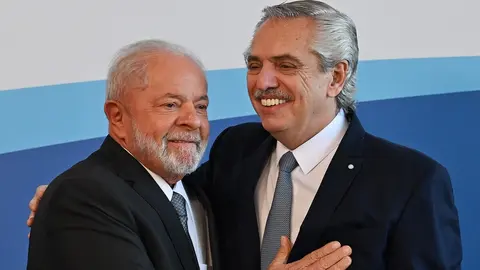Peronism-Kirchnerism is still alive in Argentina

What has to happen for a candidate whose administration has resulted in 140% inflation, 40% poverty, a currency that does not even sell like paper to the peso and a bankrupt Central Bank, to be resurrected and for Argentine voters to give him the opportunity to dispute a run-off vote to become the next tenant of the Casa Rosada? Well, that the clientelist regime built by Peronism has so permeated society that it makes change very difficult.
The economic disaster that has turned a country that once aspired to challenge the primacy of the United States in many economic, scientific and cultural fields into a pariah that survives on IMF loans that it never pays back does not seem to be reason enough for Argentines to decide to slam the door on a regime that is already eighty years old and can perpetuate itself even longer.
Sergio Massa, the country's not-so-new Minister of Economy in view of the results of his administration, won 36.68% of the vote compared to 29.98% for the surprising Javier Milei, leaving the moderate Patricia Bullrich, who won only 23.83% of the vote, out of the race.
Logically, if the votes of the representative of the centre-right Macrista party were to go in the second round to those of Libertad Avanza, Milei would comfortably surpass the 50% barrier, which would make him an unprecedented president. However, it is by no means clear that Argentines will overcome the fear instilled in them by Massa and all the Peronist-Kirchnerist institutional officials, with the renewed head of Greater Buenos Aires Axel Kicillof at the head.
Their propaganda machine warned them that if they did not choose the status quo, they would be heading for the abyss; that they would be entering uncharted territory in which essential public services such as health, education, scientific and technological research, and above all the numerous subsidies, those that manage to keep many social strata in relative poverty, but which make them believe that if Peronism ends, even those little payments will be taken away. And that, of course, the ultra-liberal economist Javier Milei would reverse social gains and rights such as gay marriage and abortion.
For the second and final round of these presidential elections, Sergio Massa has already received important foreign support: China has provided him with a generous loan of 6.5 billion dollars, so that at least until 19 November the country's battered economy will not generate any more shocks. Beijing is betting on a Peronist Argentina integrated into the BRICS bloc, something radically opposed to the postulates and promises of Milei, whose main motto is to reduce the elephantine size of the state, lord and giver of perks and privileges, perks and subsidies, and let the recognised inventive capacity of Argentines favour private initiative, with the promise of returning to rub shoulders with the great European powers in the short term and with the United States itself in no more than three decades' time.
In the three weeks that remain until the new elections, there will be a succession of manoeuvres aimed at gathering the support of the other two eliminated candidates: the 700,000 votes of the traditional left, embodied by the candidate Myriam Bregman, and those of the anti-Kirchnerist Peronist Juan Schiaretti, the current governor of Córdoba.
The main losing party, Juntos por el Cambio (Together for Change), frustrated by Bullrich's elimination, is likely to implode and its still hopeful voters will be divided between Milei and abstention. The latter, however, is trying to avoid such a disintegration by offering the defeated Bullrich the decisive Security Ministry in his hypothetical future government.
Let us rule out, at least for the moment, the opinion polls, which are still in the doldrums; some had even predicted that Milei would win in the first round. What can be concluded is that the country's dire situation, especially with regard to the economy and security, was, according to the old parameters, the most obvious reason for Argentina to have extended the death certificate of Peronism-Kirchnerism. Now, not only is it alive, but if it prevails on 19 November it could give another twist to the system, making alternation even more difficult, if not impossible.



